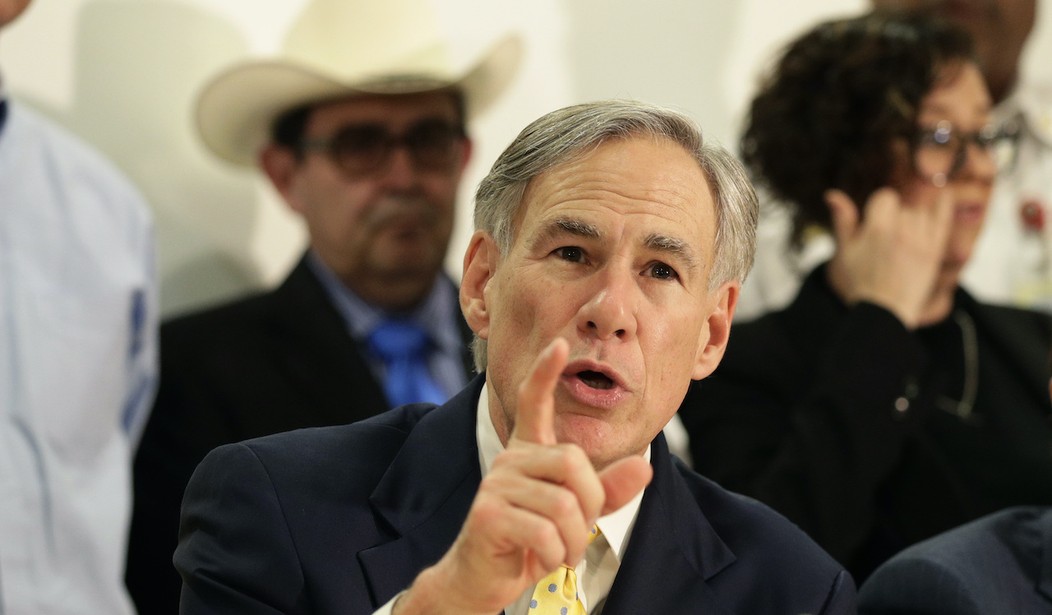Texas Gov. Greg Abbott, who recently declared that making the state a Second Amendment Sanctuary is one of his top legislative priorities, is getting grief from progressives in the Lone Star State for not inviting anyone outside of law enforcement to what was billed as a “roundtable discussion” on public safety priorities in the current legislative session.
The left-wing rag known as the San Antonio Current seems particularly butthurt over the governor’s decision to exclude activists from the roundtable.
Hard to imagine how there was much give and take when the nine other folks at the Gov’s table ranged from Mitch Landry, deputy executive director of the Texas Municipal Police Association to Jennifer Tharp, Comal County’s Criminal District Attorney. Four of the listed participants were from police unions.
Notably absent — especially so in the post-George Floyd era — were any police accountability advocates, criminal defense attorneys, people with mental health expertise or even city mayors.
But why would we expect anything different from Abbott?
Like other Republicans, Abbott has been on a law-and-0rder kick lately, figuring that to be a winning ballot-box issue. And his answer to most big issues of the day, whether it’s the pandemic or public safety, seems to be “give my office more control.”
After Austin’s city council voted last fall to shift funds from police coffers into social services, Abbott repeatedly called on the Texas Legislature pass a law barring cities from cutting police budgets. In the wake of that move, he also said he’s weighing a state takeover of the Austin’s police force.
“Texas is a law-and-order state, and we are going to ensure that we keep it that way,” Abbott said during a press conference that followed Thursday’s friendly chat with law enforcement officials.
The Current claims that the public safety roundtable “echoes” a roundtable discussion that Abbott hosted after the shooting at Santa Fe High School in 2018 in which ten people lost their lives.
That gathering included parents, teachers, students, lawmakers and “interest groups that advocate for and against further gun regulations,” his office said at the time. Notably absent, though, were gun-control groups Moms Demand Action and March for Our Lives, not to mention leaders from the state’s teacher’s unions.
After the school shooting roundtable, Abbott — who enjoys a 100% approval rating from the NRA — offered a list of 22 ideas that stemmed from the chat. They ranged from placing cops in front of schools to “mandating parent training.” Not a one called for stricter gun-control measures.
One-sided discussions aren’t exactly unusual in politics today, and I’ve seen plenty of panel discussions on public safety that failed to include anyone from the Second Amendment community. In fact, the Texas Democratic Party hosted a “Gun Violence Prevention Virtual Panel” last July that featured Moms Demand Action founder Shannon Watts as the moderator and host, but had virtually no representation from anyone on the other side of the issue.
Did the Current complain at the time that the Democratic Party was ignoring the voices of pro-gun Democrats (of which there are still a few in Texas)? They did not, which is why their current kvetching rings hollow. The paper claims that Abbott surrounded himself with “yes men” during his roundtable, but how is that any different from Democrats surrounding themselves with “yes women” who embrace restrictions and infringements on the right to keep and bear arms?
This is much ado about nothing, frankly. Abbott has made his position clear when it comes to defunding the police, and he’s not obliged to invite any particular group or ideology to the table just because they disagree. There’s no such thing as a Fairness Doctrine for politics, nor should there be. And since the Current didn’t appear to be bothered by the Democrats’ one-sided conversation about “preventing gun violence,” they don’t have much room to complain about the Republican governor’s decision to exclude those outside of law enforcement from taking part in a discussion about public safety.








